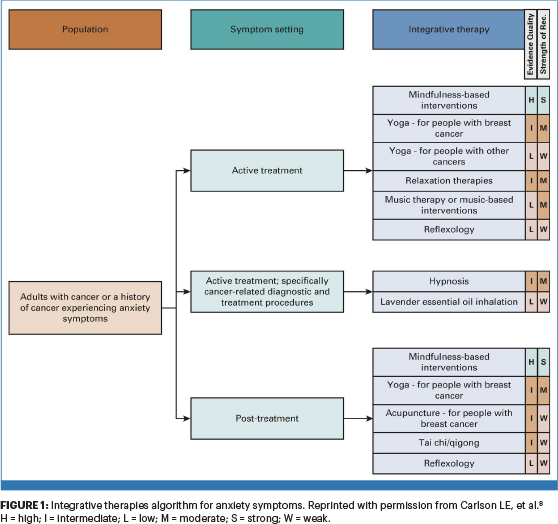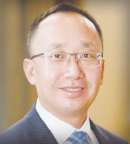
Joke Bradt, PhD, MT-BC
Guest Editor’s Note: Psychological distress is highly prevalent in cancer populations throughout the disease trajectory. Integrative modalities are being increasingly used for managing the associated symptoms. In this article, Joke Bradt, PhD, MT-BC, summarizes the latest joint guideline published by the Society for Integrative Oncology and ASCO on the use of integrative approaches for managing anxiety and depression in adults living with cancer both during and after active treatment.
People with cancer frequently report elevated levels of psychological distress and depression in response to diagnosis and treatment. Of note, the prevalence of mental health problems in adults with cancer is significantly higher than in the general population, with the occurrence of clinical depression estimated at approximately 21% across all types of cancer1 and 24% in people with advanced stages of cancer.2 Furthermore, about 18% of adults with cancer report elevated anxiety,3 and prevalence rates are much higher (up to 43%) in long-term cancer survivors.4 Undertreatment of mental health problems may adversely affect cancer treatment and recovery, as well as quality of life and survival.5
Approximately 51% all people living with cancer report using integrative or complementary therapies,6 such as acupuncture, aromatherapy, creative art therapies, massage, mindfulness-based interventions, tai chi, yoga, and natural products. Integrative oncology is defined by the Society for Integrative Oncology as “a patient-centered, evidence-informed field of cancer care that uses mind and body practices, natural products, and/or lifestyle modifications from different traditions alongside conventional cancer treatments.”7
Given the high use of integrative therapies in people with cancer to help manage ongoing psychosocial symptoms, it is important to summarize and critically evaluate the available evidence. To do so, the Society for Integrative Oncology and ASCO joined forces to assemble an international, multidisciplinary panel of experts. They recently published a guideline to provide evidence-based recommendations regarding the use of integrative approaches for managing anxiety and depression symptoms in adults living with cancer both during and after active treatment (Figure 1).8 The guideline complements another ASCO guideline focused on screening for, diagnosing, and treating anxiety and depression with a range of conventional psychosocial, behavioral, and psychopharmacologic treatment approaches in adults with cancer.9

The evidence base for the new guideline consisted of systematic reviews, meta-analyses, and randomized controlled trials published between 1990 and 2023.8 In total, the panel’s recommendations were based on 30 systematic reviews and meta-analyses and 80 randomized controlled trials in which integrative therapies were compared with the standard of care, placebos, sham interventions, other interventions, or active controls.
Using Integrative Therapies During and After Active Cancer Treatment
The strongest recommendation in the guideline across both anxiety and depression symptoms is that mindfulness-based interventions should be offered during cancer treatments. The next strongest recommendation is that music therapy and other music-based interventions may be offered to adults with cancer and that yoga may be offered to people with breast cancer specifically; for those with other types of cancer, the strength of recommendation for yoga is weak. Relaxation interventions may also be offered to address anxiety and depression, but it is worth noting that the recommendation for the use of relaxation interventions was stronger for anxiety than for depression. Reflexology may be offered for anxiety and depression, although the recommendation was weak.
To address anxiety during cancer-related diagnostic and treatment procedures specifically, hypnosis and aroma therapy (inhalation) may be offered.
Similar to the recommendations during active treatment, mindfulness-based interventions were strongly recommended for addressing both anxiety and depression symptoms after treatment. Yoga received the next strongest recommendation for managing both anxiety and depression, but here, too, this was strongest for adults with breast cancer. Tai chi or qigong practices may be considered to help alleviate depression and anxiety symptoms, and reflexology may be recommended for anxiety but not for depression. Acupuncture may also be considered for reducing anxiety symptoms after treatment, but the evidence for acupuncture was limited to women with breast cancer.
Guest Editor

Jun J. Mao, MD, MSCE
Lack of Support and Inconclusive Evidence for Other Approaches
Available evidence indicated a lack of support for the use of expressive writing for anxiety or depression symptoms. Given the consistency of findings across 16 studies and more than 2,000 participants, the panel concluded that pursuing more studies in this area is not likely to change outcomes.
Although there was some evidence available for nutritional interventions, light therapy, psilocybin-assisted therapy, massage, dance/movement therapy, laughter therapy, healing touch, acupressure, biofeedback, autogenic training, energy healing, melatonin, or other natural products and supplements for addressing anxiety symptoms, the evidence was inconclusive, and therefore, no recommendations could be made. Evidence related to the management of depression symptoms—via nutritional interventions, light therapy, psilocybin-assisted therapy, massage therapy, biofeedback, autogenic training, energy healing, melatonin, and other natural products and supplements—was also inconclusive. This does not mean these therapies are not helpful, but more evidence is needed to make definitive recommendations.
Recommendations for Future Research
The guideline includes several recommendations for future research8:
- Increase research efforts for promising as well as commonly used therapies such as yoga for people with cancer diagnoses other than breast cancer, and research overall on healing touch and therapeutic touch, tai chi and qigong, natural health products, and creative arts therapies (such as art therapy and dance/movement therapy)2;
- Conduct studies that focus on people with cancers other than breast and those with metastatic disease3;
- Increase enrollment of people from diverse backgrounds;
- Conduct implementation trials and pragmatic research in the areas where moderate-to-strong evidence is available to help bridge evidence-based treatments from efficacy to implementation.4
A board-certified music therapist, Dr. Bradt is Professor and Program Director of the PhD Creative Arts Therapies Program at Drexel University College of Nursing and Health Professions, Philadelphia.
DISCLOSURE: Dr. Bradt reported no conflicts of interest.
REFERENCES
1. Riedl D, Schuessler G: Prevalence of depression and cancer—A systematic review. Z Psychosom Med Psychother 68:74-86, 2022.
2. Mitchell AJ, Chan M, Bhatti H, et al: Prevalence of depression, anxiety, and adjustment disorder in oncological, haematological, and palliative-care settings: A meta-analysis of 94 interview-based studies. Lancet Oncol 12:160-174, 2011.
3. Mitchell AJ, Ferguson DW, Gill J, et al: Depression and anxiety in long-term cancer survivors compared with spouses and healthy controls: A systematic review and meta-analysis. Lancet Oncol 14:721-732, 2013.
4. Brandenbarg D, Maass SWMC, Geerse OP, et al: A systematic review on the prevalence of symptoms of depression, anxiety and distress in long-term cancer survivors: Implications for primary care. Eur J Cancer Care (Engl) 28:e13086, 2019.
5. Zhu J, Fang F, Sjölander A, et al: First-onset mental disorders after cancer diagnosis and cancer-specific mortality: A nationwide cohort study. Ann Oncol 28:1964-1969, 2017.
6. Keene MR, Heslop IM, Sabesan SS: Complementary and alternative medicine use in cancer: A systematic review. Complement Ther Clin Pract 35:33-47, 2019.
7. Witt CM, Balneaves LG, Cardoso MJ, et al: A comprehensive definition for integrative oncology. J Natl Cancer Inst Monogr 2017:lgx012, 2017.
8. Carlson LE, Ismaila N, Addington EL, et al: Integrative oncology care of symptoms of anxiety and depression in adults with cancer: Society for Integrative Oncology–ASCO guideline. J Clin Oncol 41:4562-4591, 2023.
9. Andersen BL, Lacchetti C, Ashing K, et al: Management of anxiety and depression in adult survivors of cancer: ASCO guideline update. J Clin Oncol 41:3426-3453, 2023.

